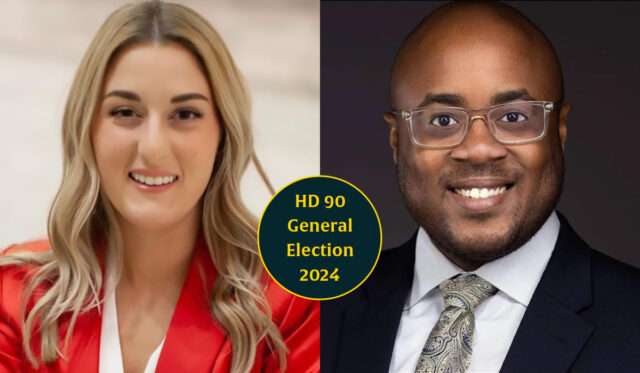

(Correction: In an earlier version of this story it was reported HD 90 candidate Nana Dankwa emigrated to the U.S. from Ghana. Dankwa’s parents emigrated in the 1970s, and he was born in Oklahoma City.)
For the first time in more than a decade, the race for Oklahoma House District 90 does not feature someone named Echols on the ballot.
In the August GOP primary, Emily Gise defeated Matt Echols, the brother of HD 90 Rep. Jon Echols (R-OKC) who held the seat for more than a decade while rising to become majority floor leader and one of the Oklahoma Legislature’s most influential members. Meanwhile, Nana Dankwa was the only Democrat to file for HD 90 and is making another run at the open seat after Echols defeated him in 2022 to earn a final term.
For Dankwa, 43, running after a third-place Ward 1 City Council finish in 2021 and after receiving 36 percent of the vote against Jon Echols in 2022 continues a lifelong interest in politics. Dankwa is a first-generation American. His parents came to the U.S. from Ghana in the 1970s and he was born in OKC.
“I’m a first-generation American,” he said. “I’ve lived here my entire life. I went K through 12 and got a bachelor’s from UCO. I’ve worked as a surgical tech in the medical field, and I went to OCU law school. Now I’m an attorney working in banking and consumer protection. I’ve always been into politics, even going back to kindergarten.”
Gise, 31, has spent much of her career working for the Oklahoma Department of Human Services. Her work there sparked an interest in taking policymaking to the next level.
“I’ve had nearly a decade’s worth of experience with the state government, and I’ve learned a lot of things in that time that are often determined by the state Legislature,” she said. “I saw a need for someone that had some boots-on-the-ground experience so that was also a catalyst in deciding to run.”
Running from Lake Overholser southeast to the intersection of Interstate 44 and the McClain County line, HD 90 is home to Will Rogers International Airport and Western Heights Public Schools. It includes parts of Oklahoma City, Cleveland County and the suburbs of Yukon and Mustang.
Ryan Walters ‘certainly concerning’ to both candidates
Both Gise and Dankwa have significant concerns about controversial Oklahoma Superintendent of Public Instruction Ryan Walters, who has drawn bipartisan criticism for his handling of federal pandemic funding and his crusades against certain library books and teacher certificates.
“It’s certainly concerning,” Gise said of Walters’ tenure. “I’m excited to see some of the findings that come from the Legislature as far as increasing accountability. He spends a lot of time in the media, and that is concerning to me as well when you consider that 80 percent of fourth graders aren’t where they need to be. I think it’s time to buckle down and get serious, because those will be our future leaders and voters. I think it’s a serious issue.”
Dankwa also sees Walters’ term thus far as unnecessarily problematic.
“I am personally unhappy with him as a state superintendent,” Dankwa said. “I don’t like his focus on things that are outside the scope of educating our children. He’s brought in a lot of political issues, and he uses them to create chaos. I think it’s government overreach at its worst, and a lot of people don’t like that. I get complaints about him all of the time from people in both parties.”
Dankwa said Oklahoma still doesn’t fund public schools at a level necessary for students to prosper, something he said could have long-term effects.
“People ask if there is a limit to funding it, and I don’t know that there is,” he said. “We need to continue to have public funds go to public schools from top to bottom. If we don’t, I think that it will set us back. We won’t be as economically competitive with other states as we could be.”
Gise said one of her concerns with public education in the state centers on teacher retention. She has two siblings who are teachers who have lamented the preparedness of their students.
“I think our system is hurting right now, including in the area of retention,” she said. “Two of my sisters are teachers, and from what I hear from them, a lot of the students they teach are coming in behind in reading, which compounds problems later on for those students. I think we need a stronger focus on reading, writing and math. We also have to do some things to recruit and retain teachers. I think we also have to encourage workforce readiness and more apprenticeships. There are a lot of opportunities with trade jobs out there that are high-paying good jobs that are in demand.”
The future of Oklahoma’s economy
Gise said the state has done a good job in attempting to attract businesses through incentives. She cited the MidAmerica Industrial Park in Pryor as one example. The state has had hits and misses when it comes to luring industry to the state, however. Canoo has set up shop in OKC, but other companies like Panasonic have passed.
“We’re embracing wind and solar, but I think we also need to say that we’re going to help build your workforce through things like the ‘Talent Pipelines‘ partnership directory with high schools and technical schools,” Gise said. “I think that’s a great step in the right direction. Tech is also exploding, and it’s estimated that 50 percent of workers will need new digital skills by the end of 2025. Developing a workforce with those skills helps grow our economy, and it also impacts rural Oklahoma because so many jobs can be done remotely now.”
Dankwa said a company deciding whether to relocate to Oklahoma might be turned off by the state’s education, health care and workforce issues, along with its political climate.
“I think all of that makes us less attractive to industries,” he said. “They’ll go to other places where they can be sure the children of their employees are educated and the workforce is educated. That’s another reason it’s necessary to fund our schools.”
Dankwa said the atmosphere in the state is largely the result of one-party rule.
“I hear from people that it’s gotten too corrupt and the people in there aren’t doing a good job and they’re not happy with that situation,” he said. “My response to that is don’t keep voting the same people in. The Republicans have had a supermajority for a long time, and I think it’s created unease in the population when it comes to what’s going on in their government. All of that has an impact on how we function as a state.”




















